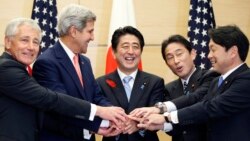The U.S.-Japan Security Consultative Committee (SCC) convened in Tokyo, October 3, with the participation of both the U.S. Secretaries of State and Defense and Japan’s Ministers for Foreign Affairs and of Defense, a historic first.
On the occasion of this significant meeting, the four senior officials reaffirmed the indispensable role our two countries play in the maintenance of international peace and security and reconfirmed our Alliance’s commitment to the security of Japan through the full range of U.S. military capabilities, including nuclear and conventional.
Our two sides also put forward a strategic vision that will effectively promote peace, security, stability, and economic prosperity in the Asia-Pacific region, while reflecting our shared values of democracy, the rule of law, free and open markets, and respect for human rights.
Secretaries Kerry and Hagel and their Japanese counterparts also exchanged views on the evolving security environment in the Asia-Pacific region and decided upon several steps to significantly upgrade the capability of the U.S.-Japan Alliance, including the deployment to Japan of more advanced aircraft.
Our strategic vision for a more robust Alliance and greater shared responsibilities will be based on revising the 1997 Guidelines for U.S.-Japan Defense Cooperation, expanding security and defense cooperation in the Asia-Pacific region and beyond, and approving new measures that support the realignment of U.S. forces in Japan.
The United States also welcomed Japan’s determination to contribute more proactively to regional and global peace and security. Our two sides stressed the importance of multilateral cooperation with regional and international partners.
The United States and Japan have resolved to be full partners in a more balanced and effective Alliance in which our two countries can jointly and ably rise to meet the regional and global challenges of the 21st century, by investing in cutting-edge capabilities, improving interoperability, modernizing force structure, and adapting Alliance roles and missions to meet contemporary and future security realities.
To this end, we have pledged to emphasize cooperation and coordination, including on information security, equipment and technology, cyber security, and space security, in order to broaden and deepen cooperation across a wide range of Alliance issues.
“Japan is changing,” said Secretary Kerry, “and so is its neighborhood. And today, we not only look back in pride on the last 52 years of U.S.-Japan alliance, but we look ahead as we define a path toward progress in the Asia Pacific [region] that will ensure the next half century is as successful as the last.”
On the occasion of this significant meeting, the four senior officials reaffirmed the indispensable role our two countries play in the maintenance of international peace and security and reconfirmed our Alliance’s commitment to the security of Japan through the full range of U.S. military capabilities, including nuclear and conventional.
Our two sides also put forward a strategic vision that will effectively promote peace, security, stability, and economic prosperity in the Asia-Pacific region, while reflecting our shared values of democracy, the rule of law, free and open markets, and respect for human rights.
Secretaries Kerry and Hagel and their Japanese counterparts also exchanged views on the evolving security environment in the Asia-Pacific region and decided upon several steps to significantly upgrade the capability of the U.S.-Japan Alliance, including the deployment to Japan of more advanced aircraft.
Our strategic vision for a more robust Alliance and greater shared responsibilities will be based on revising the 1997 Guidelines for U.S.-Japan Defense Cooperation, expanding security and defense cooperation in the Asia-Pacific region and beyond, and approving new measures that support the realignment of U.S. forces in Japan.
The United States also welcomed Japan’s determination to contribute more proactively to regional and global peace and security. Our two sides stressed the importance of multilateral cooperation with regional and international partners.
The United States and Japan have resolved to be full partners in a more balanced and effective Alliance in which our two countries can jointly and ably rise to meet the regional and global challenges of the 21st century, by investing in cutting-edge capabilities, improving interoperability, modernizing force structure, and adapting Alliance roles and missions to meet contemporary and future security realities.
To this end, we have pledged to emphasize cooperation and coordination, including on information security, equipment and technology, cyber security, and space security, in order to broaden and deepen cooperation across a wide range of Alliance issues.
“Japan is changing,” said Secretary Kerry, “and so is its neighborhood. And today, we not only look back in pride on the last 52 years of U.S.-Japan alliance, but we look ahead as we define a path toward progress in the Asia Pacific [region] that will ensure the next half century is as successful as the last.”

















